| |
New World
Demons Unmasked at Last!!
|
|
Mexican
civilization began with the OLMECS and was highly civilized and
advanced....The downward spiral began around 1400 B.C. when the
Phoenicians arrived. |
Around
the year 1100 A.D., Satan was on the MOVE preparing for the last quarter
of world history which was to begin with the discovery of the New World
and the Reformation. In 1066, England was invaded and subjugated by
Roman Catholic William the Conqueror, and a century later Hibernia (Ireland),
was annexed to England and Rome by the grandson of William the Conqueror.
In
1139, the country of Portugal was created which became the homeland
of the fake "discoverer" Christopher Columbus.
During all of this
Satanic activity in the Old World, Satan was also very active on both
sides of the Atlantic ocean. After the Resurrection of Christ, many
of Satan's most powerful demons were unable to carry on their activities
in the Old World . . . so they emigrated to the New!!
Satan's monstrosities
or GIANTS had already found a refuge in the New World when they fled
from Joshua during the conquest of the Promised Land (1500 B.C. ).
The migration of the Aztec or Mexican nation to the PROMISED LAND!!
Around
the year 1100 A.D., a demon god named Huitzilopochtli told a warlike
tribe of Indians named the Mexica or Mexicans to leave their land and
travel south in order to seek a PROMISED LAND....This journey seems
to be a Satanic mockery or travesty of the travels of the Israelites
to the real Promised Land.
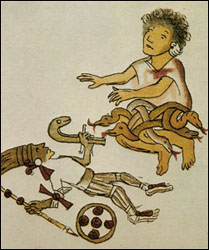 Aztec mother
goddess Calicoes giving
birth to Huitzilopochtli.
Aztec mother
goddess Calicoes giving
birth to Huitzilopochtli. |
| |
The
account of the founding of Tenochtitlán almost reads
like the story of the Exodus found in the Holy Bible. |
|
|
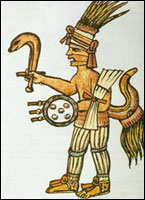
Demon god Huitzilopochtli, patron of the Aztecs. Huitzilopochtli
means "left claw of shining feathers." |
Here
is an account of the migration of the Aztecs by historian Fray Diego
Durán:
In the year 1193
after the birth of our Redeemer, Jesus Christ, the Aztec nation reached
this land. These people, like the others who populated the country,
departed from seven caves in a land called Aztlán. This name
could mean "Whiteness" or "Place of the Herons."
Because of this the people were called Aztec which means "People
of Whiteness." They were also called Mecitin or Mexicans, in
honor of the priest and lord who guided them, whose name was Meci.
The entire tribe took this name, just as the Romans took theirs from
Romulus, the founder of Rome. The Aztecs now have another name, which
they acquired after they took possession of this land: Tenochca, because
of the tenochtli, or prickly pear cactus, that sprang from
the rock in the place where they built their city. In this sense Tenochca
means "The owners of the prickly pear cactus.
The Aztecs left the seven caves in order to seek the Promised Land.
According to traditions left by their priests and certain painted
manuscripts, there were long delays in the migration and on these
stops they inhabited many lands, fertile places abounding in water
and forests. (Fray
Diego Durán, The Aztecs: The History of the Indies of New
Spain, p. 14).
Here is another
description of their migration by a Jesuit historian named José
de Acosta:
Three hundred
and two years having passed since the six clans I have described left
their land and settled in that of New Spain, and when that was well
populated and reduced to order and polity, those of the seventh cave
or family, which is the Mexican nation, arrived in it; like the others,
it came from the provinces of Aztlán and Teuculhuacán.
They were a well-organized and civil people and very warlike. These
Indians worshiped the idol Huitzilopochtli which
has been described at length above; and the devil who resided in that
idol, spoke to and easily influenced that nation.
And so he ordered them to leave their land, promising to make them
princes and lords of all the provinces that the other six nations
had settled; that he would give them very extensive lands, much gold,
silver, precious stones, feathers and rich mantles. Accordingly
they set forth with their idol placed in an ark made of reeds, carried
by four chief priests with whom he communicated and he revealed to
them in secret the events of their journey, telling what was going
to happen, giving them laws and showing them rites and ceremonies
and sacrifices. They took not a step without the consent and orders
of this idol; he told them when to travel and when to stop and where
and they obeyed him unquestioningly. The first
thing they did wherever they stopped was to build a house or tabernacle
for their false god, and they always set it in the middle of
the camp that they established, with the ark placed on an altar such
as the Catholic church uses. Having done this, they would sow grain
for bread and the other vegetables that they used; but were so steadfast
in obeying their god that if he thought it well to harvest the crop
they would do so, and if not, when he ordered them to break camp,
everything was left to feed the old and sick and exhausted folk, whom
they left behind everywhere they settled so that the whole land would
be occupied by those of their nation. (José de Acosta, Natural
and Moral History of the Indies, pp. 386-387)
This Aztec migration
with the idol giving them instructions was almost an exact duplicate
of the journey of the children of Israel to the Promised Land with JEHOVAH
speaking to them directly:
And on the day
that the tabernacle was reared up the cloud covered the tabernacle,
namely, the tent of the testimony: and at even there was upon the
tabernacle as it were the appearance of fire, until the morning.
So it was always: the cloud covered it by day, and the appearance
of fire by night.
And when the cloud was taken up from the tabernacle, then after that
the children of Israel journeyed: and in the place where the cloud
abode, there the children of Israel pitched their tents.
At the commandment of the LORD the children of Israel journeyed, and
at the commandment of the LORD they pitched: as long as the cloud
abode upon the tabernacle they rested in their tents.
And when the cloud tarried long upon the tabernacle many days, then
the children of Israel kept the charge of the LORD, and journeyed
not.(Numbers 9:17-19).
That demon called
Huitzilopochtli in the New World was probably right there opposing the
entrance of the children of Israel to the Promised Land!!
The
founding of Tenochtitlán
After many years
of wandering and fighting with other tribes, the demon idol Huitzilopochtli
told them to look for an eagle perched on a prickly cactus feeding on
colorful birds:
On
the following night Huitzilopochtli appeared in a dream to an old
priest and told him that they must search in that lake for a cactus
growing out of a stone according to what the god said, it was the
place where, by his orders, they had thrown the heart of their enemy
Copil, son of the sorceress. And on the cactus they would see a most
beautiful eagle feeding on some very colorful birds, and when they
saw this they would know that it was the place where their city was
to be founded, a city that would prevail over all others and be famous
in the world. In the morning the old man, gathering together all the
people from the eldest to the youngest, made them a long speech about
how much they owed their god and about the revelation he had had that
night though unworthy of receiving it; he concluded that all must
go in search of that happy place that was promised to them, and this
aroused so much devotion and joy in everyone that they undertook the
task without delay. And, dividing into groups among all that expanse
of reeds and canebrakes and sledge in the lake, they began to search
for signs of the revelation of this greatly desired place (José
de Acosta, Natural and Moral History of the Indies, pp. 392-393).
At last the demon
idol's prediction came true and they found the eagle perched on the
prickly cactus:
At last, after
much searching here and there, the cactus growing out of a rock appeared,
and on it was a royal eagle with wings opened and spread wide, turned
toward the sun and receiving its warmth; all around him was a great
variety of rich bird feathers, white, red, yellow, blue, and green,
of the fine quality they use to make pictures. The eagle had a very
beautiful bird in its claws. As soon as they saw it and recognized
the place of the oracle, all knelt and offered great veneration to
the eagle, and it also bowed its head to them, looking all around.
There were great cries and demonstrations of devotion and offerings
of thanks to the creator and to their great god Huitzilopochtli, who
was their father in everything and had always told them the truth.
For this reason they gave the name of Tenochtitlán to the city
that they founded there, which means "a cactus on a stone";
and to this very day on their arms and insignia there is an eagle
on a cactus with a bird in one claw and the other on the cactus. (José
de Acosta, Natural and Moral History of the Indies, p. 393).
Shamans can predict
the future to a certain extent otherwise people would not pay to have
their fortunes told.
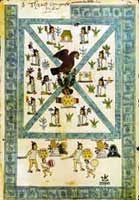
The demon idol Huitzilopochtli told the Aztecs to found their
city where they saw an eagle sitting on a prickly cactus. |
|
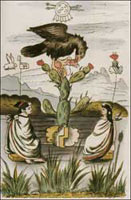
The eagle on the cactus was the symbol for the founding of the
Aztec capital of Tenochtitlán. |
The Canaanites/Phoenicians
were mass slayer of human beings as human sacrifices. Stonehenge in
England was just one of their worldwide hideous human sacrifice sites.
The
worship of the Sacred Heart in Tenochtitlán
Once the city of
Tenochtitlán was founded about 1325, that old serpent the devil
set about to build up a kingdom in his own image and likeness. It was
the closest thing to hell on earth that the world has ever seen. The
devil ruled by FEAR and the Aztecs practiced every filthy diabolical
art that has ever disgraced the human race.
Their kingdom was
the ROME OF THE NEW WORLD; a militaristic state with a rigid social
caste and continual bloody sacrifices of men, women and children. Among
their diabolical practices were witchcraft, sorcery, divination, bloodletting,
cannibalism, flaying the skin from the bodies of their victims etc.,
etc.
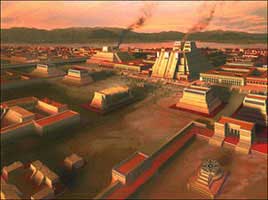
The huge city of Tenochtitlán was built on a lake and had
a population of over 300,000 people. Smoke from the bloody altars
ascended constantly. The Spanish described it as a SLAUGHTERHOUSE. |
| |
The
worship of the Sacred Heart was rampant in Tenochtitlán.
The
priest often ate the hearts of victims who died
bravely!!
|
|
|
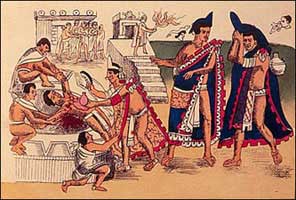
Bloody
Aztec human sacrifice in which the victim's heart was ripped out
and offered to their bloodthirsty demon idol. |
This slaughterhouse
commenced with the coming of the Phoenicians around 1400 BC.

The idol
Huitzilopochtli was the sun god and they believed that he required
human blood in order to rise each morning.
|
|
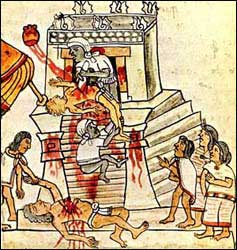
After the
victim had his heart ripped, out he was thrown down the steps
of the pyramid and then chopped up and eaten!!
|
The demonic Aztec
priests actually ate the hearts of the bravest victims who faced such
a horrid death bravely
Gimme
some skin—fanatical Aztec flayers!!
The
demonic priesthood of the Aztec religion really knew how to get under
their victims' skins —literally....As soon as the corpses were
rolled down the temple steps with the hearts extracted, they would literally
skin the bodies and dress up in the skins. It was part of the temple
ritual to appease a demon named Xipe Totec.

This Aztec idol named Xipe Totec is not wearing gloves.... It
is wearing human skin from the body of one of the flayed
victims!! |
| |
The
Spanish were appalled at the spectacle that greeted their
eyes when they arrived in Tenochtitlan!! |
|
|
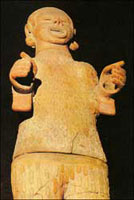
Demon idol Xipe Totec wearing human skin. |
The Phoenicians
turned the New World into a literal hell on earth.
Coatlicue
a.k.a. Our Lady of Guadalupe
The Spanish brutally
suppressed the Aztec religion and burned all the their books about the
true history of their nation. As in Haiti, the Mexican just gave their
idols Latin Church names and continued to worship them as fervently
as ever.
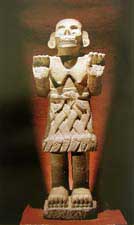
Statue of Coatlicue, Mexican Aztec mother goddess, with her skirt
of serpents and clawed feet. Today she is called Our Lady of Guadeloupe!! |
| |
Coatlicue
in the Aztec pantheon was renamed Our Lady of Guadalupe
and she continued to be worshipped as fervently as ever.
The
cross was a ubiquitous symbol in Mexico and continued
to adorn the Latin Church cathedrals.
|
|
|
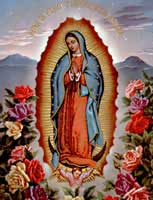 Our Lady of
Guadalupe.
Our Lady of
Guadalupe. |
Satan always looks
for similarities between his religion and Christianity in order
to corrupt the Gospel of Christ.
The
coming of the Spanish in 1518
Ruthless Spanish
conquistador Hernán Cortés (1485-1547), invaded Mexico
in 1518. The Mexican emperor Montezuma II received him with hospitality
because he believed that Cortés was a departed god named Quetzalcoatl
whose return from the east was a big part of Aztec lore:
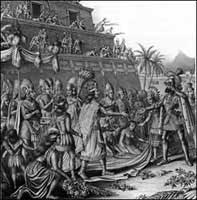
Emperor Montezuma II greeted Cortés cordially and invited
him to live in his palace. |
| |
Emperor
Montezuma greeted Cortés with awe and respect.
Aztec
tradition of white men from the East arriving in Mexico
went back centuries.
|
|
|
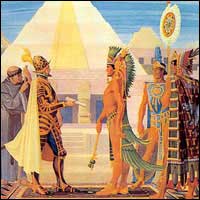
Cortés lusted for the Aztec gold. |
The Phoenicians
brought their demonic religion to the New World when they fled from
the sword of Joshua. Emperor Montezuma believed that they had returned:
The
following year, which was early in the year fifteen hundred and eighteen,
they saw coming over the sea the fleet in which the Marques del Valle,
Don Hernán Cortés, and his companions arrived. Moctezuma
was greatly perturbed by this news, and when he consulted with his
council they told him that undoubtedly their ancient and great lord
Quetzalcoatl had come, for he had said that he would return and that
he was coming from the direction of the east, whither he had departed.
There was a belief among the Indians that in past times a great prince
had left them and promised to return; I will discuss the foundation
of this belief elsewhere. At last they sent five important ambassadors
to welcome the Spaniards with rich gifts, telling them that they had
known that their great lord Quetzalcoatl was coming there and that
his servant Moctezuma had sent them to visit him, for he considered
himself the god's servant. The Spaniards understood this message through
Marina, an Indian woman they had brought with them who knew the Mexican
language.(José
de Acosta, Natural and Moral History of the Indies, p. 433).
Cortés was
very anxious to convert the emperor to Roman Catholicism and replace
the Aztec idols with his own images.
Obviously he was
very disgusted with the Aztec human sacrifices and the eating of human
flesh.
Cortés lusted
exceeding after the emperor's enormous supply of gold, but this roughneck
soldier had to maintain the pretense of a moral crusade to save the
souls of the benighted Aztecs.
Cortez
tried to convert Montezuma to the Latin Church!!
Cortés
began to expound the tenets of his faith to the emperor in an effort
to convert him to Roman Catholicism which Cortez called "Christianity."
All the New World people were very familiar with the story of the fall
of man and the promise of a Redeemer who would crush the serpent's head.
Most of them were familiar with the story of the Great Flood and the
destruction of the world by water.
When
Cortés began to expound the doctrine of the mass or the "sacramental
miracle" where the Catholics actually eat the flesh and blood of
their Creator, the emperor was appalled and horrified. Montezuma would
admit to eating human flesh but to be able to eat his Creator
was more then his credulity would allow.
Here
is a quote from a pro-Spanish historian named William Prescott in his
Conquest of Mexico:
The
eloquence of the preacher (Cortez) was wasted on the insensible heart
of his royal auditor (Montezuma). It, doubtless, lost somewhat of
its efficacy, strained through the imperfect interpretation of so
recent a neophyte as the Indian damsel (Malinche). But the doctrines
were too abstruse (difficult) in themselves to be comprehended at
a glance by the rude intellect of a barbarian. And Montezuma may have,
perhaps, thought it was not more monstrous to feed on the flesh of
a fellow-creature, than on that of the Creator himself (Prescott,
History of the Conquest of Mexico, p. 305.)
What
Prescott was saying in this piece of double talk is that Montezuma was
a barbarian and unable to comprehend the complexities of the mass and
transubstantiation, and this was a barrier to his conversion.
Cortés
was actually GLAD when Montezuma did not convert to his brand of "Christianity"
because now he could treat him and his subjects as INFIDELS, and kill
them all in order to steal their gold!!
Montezuma
decided that his own religion was actually BETTER that the perverted
"Christianity" of Cortés. The Mexicans grew more attached
to their Satanic religion when Cortés began breaking their idols
and killing them by the thousands with the sword and smallpox.
Mexico
City is built over the ruins of Tenochtitlán!!
All
of the first historians of the Mexicans say that the eagle had a BIRD
in its claw and not a serpent. The serpent was especially SACRED to
the Aztecs, as it was the symbol of their father the devil, who guided
them to their city. Sometime during the Spanish colonial era, the BIRD
was changed to a serpent in order to disguise the obviously pagan symbol.
Since
the Spanish built their "churches" right on the very places
that were polluted by human blood offered in sacrifice to Satan, Roman
Catholicism is the heir or successor of the bloody
Aztec religious system!!
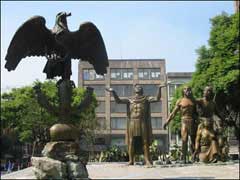
Monument
in Mexico City commemorating the foundation of Tenochtitlán.
Originally the eagle had a bird in its claw and not a serpent.
|
| |
The
Bible says that centers of Satan worship are to be turned
into outhouses or privies. |
|
|
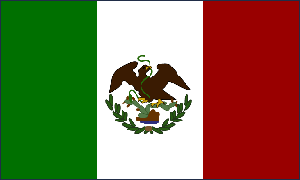
Mexican
flag with the eagle on the prickly cactus. Instead of a bird the
eagle now has a snake in its claw. |
In
the Bible, wicked Satanic cities were razed to the ground and NEVER
rebuilt because those cities were the "habitation of devils and
the hold of every foul spirit and a cage of every unclean and hateful
bird" (Rev. 18:2). We see this example numerous times in such cities
as Sodom and Gomorrah, Babylon, Ninevah, Tyre, Carthage, Jericho and
Hazor:
And
Babylon, the glory of kingdoms, the beauty of the Chaldees' excellency,
shall be as when God overthrew Sodom and Gomorrah. It shall never
be inhabited, neither shall it be dwelt in from generation to generation:
neither shall the Arabian pitch tent there; neither shall the shepherds
make their fold there. (Isaiah 13:19-20).
Jericho
was another wicked city that opposed the entrance of the children of
Israel to the real Promised Land:
And
Joshua adjured them at that time, saying, Cursed be the man before
JEHOVAH , that riseth up and buildeth this city Jericho: he shall
lay the foundation thereof in his firstborn, and in his youngest son
shall he set up the gates of it.(Joshua
6:26).
Jehu,
king of Israel, turned the temple of Satanic worship into a toilet or
latrine:
And they brake down the image of Baal, and brake down
the house of Baal, and made it a draught house (toilet) unto this
day. (II Kings 10:27).
Vital
links
The
amazing similarities between Roman Catholicism and the Aztec religion
by a Jesuit priest!!
The
Spanish Inquisition
The
Spanish Inquisition in the U.S.
References
Carrasco Davíd
& Moctezuma Eduardo Matos. Moctezuma's Mexico. Visions of the
Aztec World. University Press of Colorado, 1992.
Durán, Fray
Diego. The Aztecs: The History of the Indies of New Spain.
(Translated by Doris Heyden and Fernando Horcasitas). Orion Press, New
York, 1964.
De Acosta, José
Natural and Moral History of the Indies. (Translated by Frances
López-Morillas), Duke University Press. Durham & London,
2002.
Díaz, Gisele
& Rogers, Alan. The Codex Borgia. Dover Publications, New
York, 1993.
Markman Roberta
H. & Markman Peter T. The Flayed God: The Mesoamerican Mythological
Tradition. HarperCollins Publishers, New York, 1992.
Prescott, William
H. History of the Conquest of Mexico and History of the Conquest
of Peru . Random House Inc., New York. (Not dated).
Séjourné,
Laurette. Burning Water: Thought and Religion in Ancient Mexico.
The Vanguard Press, New York, 1956.
Copyright
© 2013 by Patrick Scrivener
Back to Main Menu
|















